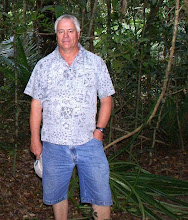 Somehow, I missed the announcement two months ago that Gay and Robinson, Inc. (Island of Kauai) was leaving the sugar business after 119 years. This leaves Hawaiian Commercial & Sugar Co. (Island of Maui) as the one remaining sugar producer in the State. How long HC&S will survive remains to be seen. I have heard rumors that HC&S's per acre sugar yields will be dismal this year, and not likely much better in the near-term future. They used to boast yields in the order of 13 tons sugar per harvested acre (2-year crop). It's been rumored that they will be substantially below this number this year, perhaps even below 10 tons, and that their yields won't likely be much better next year. If true, that certainly does not bode well for the future of the sugar industry in Hawaii.
Somehow, I missed the announcement two months ago that Gay and Robinson, Inc. (Island of Kauai) was leaving the sugar business after 119 years. This leaves Hawaiian Commercial & Sugar Co. (Island of Maui) as the one remaining sugar producer in the State. How long HC&S will survive remains to be seen. I have heard rumors that HC&S's per acre sugar yields will be dismal this year, and not likely much better in the near-term future. They used to boast yields in the order of 13 tons sugar per harvested acre (2-year crop). It's been rumored that they will be substantially below this number this year, perhaps even below 10 tons, and that their yields won't likely be much better next year. If true, that certainly does not bode well for the future of the sugar industry in Hawaii.The demise of the sugar industry in Hawaii really saddens me, in part because I am not aware of any crop anywhere else in the United States that comes close to having the energy potential that sugarcane has been demonstrated to have on a commercial scale in Hawaii. Even though Hawaii has consistently had far higher sugar yields than Brazil, and, in my mind, was the perfect proving ground in the U.S. to either prove or disprove the sustainability of ethanol production from biomass (having the nation's highest gas prices, being isolated, etc.), it could never overcome all the hurdles placed in front of it to actually launch a sugarcane-based ethanol industry. Ironically, as recently as the 1980's, sugarcane mills in Hawaii were not only energy self-sufficient, but contributed substantially to the surrounding communities, producing around 40% of the total electricity generated on three of the four major islands, with the burning of bagasse (fibrous residue).
The sugar industry had a profound effect on Hawaii's recent history, and the makeup of the ethnic groups that constitute Hawaii today. Admittedly, the history is not all glamorous. But there is a certain nostalgia associated with the fading of an important industry that even some its sharpest critics acknowledge.

3 comments:
It's really too bad that the Hawaiian sugarcane industry is all but nonexistent now. I still don't understand exactly why. Is it misinformation, where people don't realize the energy potential of sugarcane?
What a shame. Hawaii seems so perfect for a thriving sugar cane industry and I guess it was. You mentioned Brazil and how great they have done with the crop. America always seems to be late to the party.
I'm sure environmental and regulatory issues were major hurdles, but not the only hurdles. I don't think there was ever a question as to whether the energy balance would make sense.
Post a Comment